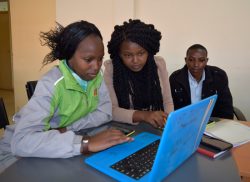Digital Literacy Programme

The Government of Kenya is exploring different plans including private sector partnerships to scale up the rollout of ambitious Digital Literacy Programme (DLP) in schools.
The programme which is aimed at equipping learners with modern day skills in technology at an early stage has so far seen 22,891 public primary schools installed with 1,170,846 digital devices.
Two local device assembly plants have been established, one at JKUAT and another one at Moi University. The production capacity for the Moi University device assembly plant is 1200 LDDs per day operating in two shifts of 8 hours each.
The production capacity for the JKUAT has two assembly lines with daily production capacity of 600 LDDs each per shift. At present, 201,811 of digital devices delivered to schools under the DLP were assembled locally.
The programme, which is being implemented in three phases has also seen 331,000 teachers trained on ICT integration with 218,253 teachers trained on CBC and other 93,009 teachers trained on use of ICT and device utilization.
At least 22,927 schools have been connected to power out of which 19,042 public primary schools have been connected to power by national grid and 3,239 public primary schools have been connected to power by solar.
However, factors like the high cost of power, security of the devices, lack of enough support from education managers at the county level have sent implementing agencies back to the drawing board. The high-power cost for instance has led to disconnection of 746 schools while another 646 schools have not been connected to power. According to latest progress report by the ICT Authority, the second phase of the programme is estimated at Sh60 billion.
Implementing agencies such as the ministry of education plans to employ 520 university interns in all sub-counties to facilitate the project whose aim is to integrate ICT in schools.
The Kenya Institute of Curriculum Development (KICD) is to acquire all digital content in the cloud infrastructure for ease of access. This include books and other supplementary materials and to ‘white list’ these content for free access.
TSC with Ministry of Education has developed programme and now rolling to enhance community-based learning. They have recruited teachers into e-learning platforms and the training is ongoing.
The ICT Authority in addition to the distributed devices is in the process of acquiring additional devices for the remaining schools as well as devices for upper grades 4-6 and more teacher devices. It is developing procedures in e-learning with Ministry of Education to enable devices in schools be distributed to homes guided by Ministry of Education policy.
School internet connectivity – The Authority has developed the Schoolnet programme meant to connect schools to internet services. This is in addition to the National ICT Infrastructure Masterplan meant to guide deployment of broadband connectivity across the country. Already over 1000 schools [one school per ward] have been identified under phase 1 of Schoolnet Connectivity Project being implemented by UNICEF.
The total cost of Schoolnet is estimated to be Sh15 billion, taking into consideration the current NOFBI network. It is expected that the digital skills gained from the DLP will enable the beneficiaries to profit from the online work and cut unemployment earning them revenue as they seek and develop bigger visions.
Online work opportunities that include digital marketing and search engine optimization provides income to an estimated 282,000 people while both data entry and article writing have over 500,000 people engaged.
Kenyan youth are also earning from academic, scientific writing, transcription and virtual assistants online jobs.
